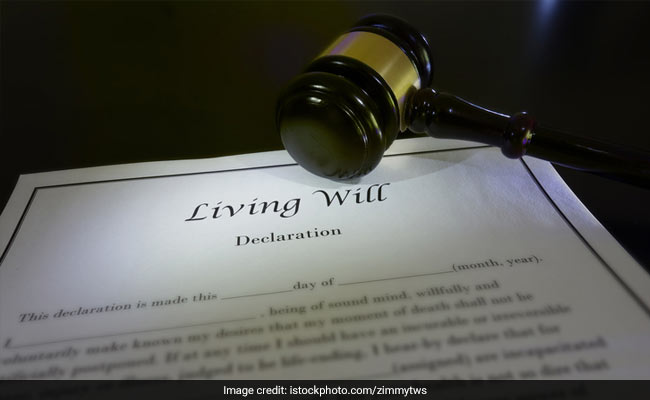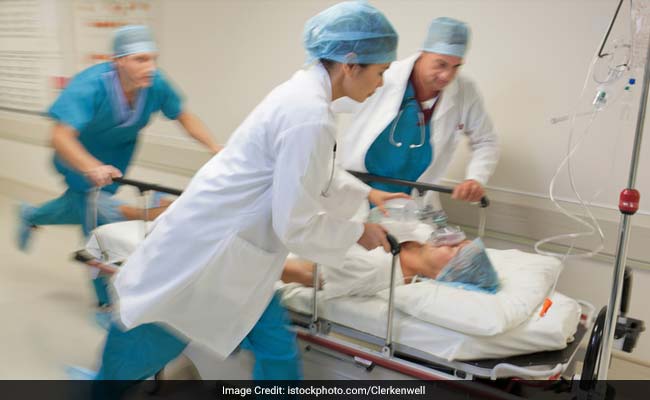The living will verdict allows removal of life support systems for terminally ill patients or the ones who have been suffering from incurable coma.

The living will verdict gives terminally ill patients the right to stop medical treatment
HIGHLIGHTS
- Living will allows passive euthanasia to terminally ill patients
- Experts say that the implementation of living will is complicated
- The implementation of living will should speedy: experts
In what has been termed as a landmark verdict, the Supreme Court of India yesterday permitted 'living will' - a provision which allows people to take a decision against artificial life support. The living will allows removal of these life support systems for terminally ill patients or the ones who have been suffering from incurable coma. A group of five judges including chief justice Dipak Misra were quoted as saying that the patients should be allowed to cross the door and meet death with dignity, once their life sanctity is destroyed.
The living will verdict will allow death with dignity to terminally ill patients: doctors
Provisions of living will
The provisions of the living will give patients the authority to instruct doctors in advance to administer the medical treatment in case they fall terminally ill or are unable to express informed consent. It gives patients the right to say 'no' to a medical treatment and avoid "protracted physical suffering."
Passive euthanasia - or the painless killing of a person who is suffering from an incurable disease or is in coma - will be applied only to a person who is terminally ill and has no hope of recovery. Guidelines will be issued for the same until the law is in place.
For contesting a will, a family member or a friend of the patient can approach the High Court. The High Court will then ask a medical board to take the decision if passive euthanasia is required or not.
Aruna Shanbaug's case sparked national debate on legalisation of living will
The legalisation of living will sparked national debate when a nurse named Aruna Shanbaug spent 42 years in a vegetative state after being brutally raped in 1973. She passed away in 2015. Back in 2011, Supreme Court had rejected the petition to stop feeding Aruna forcefully.
Passive euthanasia was allowed for the first time when the court mentioned that life support could be removed legally from such terminally ill patients.
What doctors have to say
According to Dr Naresh Bansal - senior consultant at department of gastroenterology at Sir Ganga Ram Hospital - the court's verdict is important, but still a very small step towards progress. He says, "The process of allowing passive euthanasia is still very complex, technically. Patients need to have a medical board and they also need to make a will. Very few people will be able to use it. The process should be simplified a bit."
Agrees Dr Sujeet Jha, who feels that the verdict complicates the implementation of the living will. Explaining, he says, "It should be left to two senior doctors, the patient and his/her next kin rather than involving lawyers in the process. Five people including the patient's family should be enough. Also, the living will should be attached with automatic default donor status. We can take the consent of the patients and their families if they want to donate organs."
Furthermore, Dr Jha feels that court's verdict was required because in a country like India, "Intensive Care Unit (ICU) care cannot be provided to every citizen at this stage."
"Say for instance, a 30-year-old man meets with an accident. He cannot afford ICU care at private hospital and he was unable to find a bed in government hospital. In the same government hospital, there is an 80-year-old lady. She is in a vegetative state for over 100 days. She is suffering from cancer and previously had dementia. The doctors know that she can't make it but they cannot stop her treatment because it is illegal. So, the living will is all about giving justice to dying with dignity and also giving space to someone who is in need," explains Dr Jha, who is director of institute of endocrinology, diabetes and metabolism at Max Healthcare.
However, he clarifies that the above example is not to imply that doctors are willing to kill old people in order to treat the young. "Doctors should have the discretion to withdraw treatment," he adds.
Experts also feel that implementation of living will should be done in a speedy manner. "The decision should be made in a speedy manner, probably within the next 24 to 48 hours once the patient reaches that stage of treatment. The agony of the patient should not be prolonged in the process," says cardiologist Dr Sameer Gupta.
(Dr Naresh Bansal is Senior Consultant at Department of Gastroenterology, Sir Ganga Ram Hospital)
(Dr Sujeet Jha is Senior Consultant at Department of Gastroenterology at Sir Ganga Ram Hospital)
(Dr Sameer Gupta is Interventional Cardiologist at Metro Hospital, Noida and MP Heart Clinic, Greater Kailash)
Disclaimer: This content including advice provides generic information only. It is in no way a substitute for qualified medical opinion. Always consult a specialist or your own doctor for more information. NDTV does not claim responsibility for this information.
DoctorNDTV is the one stop site for all your health needs providing the most credible health information, health news and tips with expert advice on healthy living, diet plans, informative videos etc. You can get the most relevant and accurate info you need about health problems like diabetes, cancer, pregnancy, HIV and AIDS, weight loss and many other lifestyle diseases. We have a panel of over 350 experts who help us develop content by giving their valuable inputs and bringing to us the latest in the world of healthcare.














